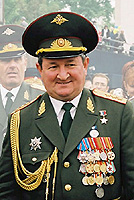Gennady Troshev
| Gennady Nikolayevich Troshev Геннадий Николаевич Трошев |
|
|---|---|

Colonel General Gennady Troshev
|
|
| Born |
14 March 1947 East Berlin, East Germany |
| Died | 14 September 2008 (aged 61) Perm, Russia |
| Allegiance |
|
| Years of service | 1969–2002 |
| Rank | Colonel General |
| Unit |
58th Army North Caucasus Military District |
| Battles/wars |
First Chechen War Invasion of Dagestan (1999) Second Chechen War |
| Awards |
|
| Other work | Advisor to the President of the Russian Federation for Cossacks affairs |
Gennady Nikolayevich Troshev (Russian: Геннадий Николаевич Трошев) (14 March 1947 – 14 September 2008) was a Russian Colonel General in the Russian military and formerly the commander of the North Caucasus Military District, including Chechnya, during the Second Chechen War. He was awarded a Hero of Russia award.
Gennady Troshev was born in 1947 in the East Berlin, in the Soviet occupation zone, the son of a Soviet officer. He spent his childhood in the ethnic Russian community in Grozny in the Chechen-Ingush Republic.
In 1969, Troshev graduated from the Kazan Tank College, and later from the Tank Academy and from the Military Academy of the General Staff. After graduating from the tank college in 1969, Troshev served in Soviet tank forces. Troshev served as the commander of the 10th Guards Uralsko-Lvovskaya Tank Division, later - as the commander of the 42nd Army Corps. and as the commander of the joint group of federal forces in Chechnya during the First Chechen War. On 1 June 1995, Troshev was appointed commander of the 58th Army, and since 29 July 1997, he served as the deputy commander of the North Caucasus Military District. In April 2000, Troshev was appointed the commander of the joint group of federal forces in the Northern Caucasus.
During his career as a commander in Chechnya he gained notoriety after advocating public executions of separatist fighters. Human rights activists had accused him of tolerating rampant abuses in the war-ravaged republic. Early in the war he declared that the shattered city of Grozny should never be rebuilt so as to serve as a warning against "treason to Russia's ethnic minorities". He also publicly defended Yuri Budanov, who was on trial for the rape and murder of an 18-year-old Chechen woman, Elza Kungayeva.
...
Wikipedia
